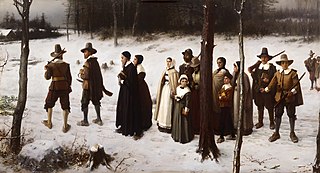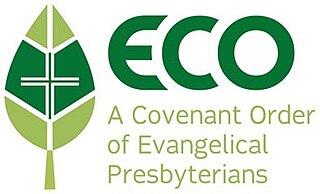Related Research Articles

Presbyterianism is a Reformed (Calvinist) Protestant tradition named for its form of church government by representative assemblies of elders. Though there are other Reformed churches that are structurally similar, the word Presbyterian is applied to churches that trace their roots to the Church of Scotland or to English Dissenter groups that formed during the English Civil War.

The Presbyterian Church (USA), abbreviated PCUSA, is a mainline Protestant denomination in the United States. It is the largest Presbyterian denomination in the country, known for its liberal stance on doctrine and its ordaining of women and members of the LGBT community as elders and ministers. The Presbyterian Church (USA) was established with the 1983 merger of the Presbyterian Church in the United States, whose churches were located in the Southern and border states, with the United Presbyterian Church in the United States of America, whose congregations could be found in every state.
Presbyterianpolity is a method of church governance typified by the rule of assemblies of presbyters, or elders. Each local church is governed by a body of elected elders usually called the session, though other terms, such as church board, may apply. Groups of local churches are governed by a higher assembly of elders known as the presbytery or classis; presbyteries can be grouped into a synod, and presbyteries and synods nationwide often join together in a general assembly. Responsibility for conduct of church services is reserved to an ordained minister or pastor known as a teaching elder, or a minister of the word and sacrament.

The Presbyterian Church in America (PCA) is the second-largest Presbyterian church body, behind the Presbyterian Church (USA), and the largest conservative Calvinist denomination in the United States. The PCA is Reformed in theology and presbyterian in government.

The United Church of Christ (UCC) is a socially liberal mainline Protestant Christian denomination based in the United States, with historical and confessional roots in the Congregational, Restorationist, Continental Reformed, and Lutheran traditions, and with approximately 4,600 churches and 712,000 members. The UCC is a historical continuation of the General Council of Congregational Christian churches founded under the influence of New England Puritanism. Moreover, it also subsumed the third largest Calvinist group in the country, the German Reformed. Notably, its modern members' theological and socio-political stances are often very different from those of its predecessors.
The Church of the United Brethren in Christ is an evangelical Christian denomination with churches in 17 countries. It is Protestant, with an episcopal structure and Arminian theology, with roots in the Mennonite and German Reformed communities of 18th-century Pennsylvania, as well as close ties to Methodism. It was organized in 1800 by Martin Boehm and Philip William Otterbein and is the first American denomination that was not transplanted from Europe. It emerged from United Brethren churches that were at first unorganized, and not all of which joined this church when it was formally organized in 1800, following a 1789 conference at the Otterbein Church.
The Confessing Movement is a largely lay-led theologically conservative Christian movement that opposes the influence of theological liberalism and theological progressivism currently within several mainline Protestant denominations and seeks to return those denominations to its view of orthodox doctrine or to form new denominations and disfellowship (excommunicate) them if the situation becomes untenable. Those who eventually deem dealing with theological liberalism and theological progressivism within their churches and denominations as not being tenable anymore would later join or start Confessional Churches and/or Evangelical Churches that continue with the traditions of their respective denominations and maintaining orthodox doctrine while being ecclesiastically separate from the Mainline Protestant denominations.

The mainline Protestant churches are a group of Protestant denominations in the United States and Canada largely of the theologically liberal or theologically progressive persuasion that contrast in history and practice with the largely theologically conservative evangelical, fundamentalist, charismatic, confessional, Confessing Movement, historically Black church, and Global South Protestant denominations and congregations. Some make a distinction between "mainline" and "oldline", with the former referring only to denominational ties and the latter referring to church lineage, prestige and influence. However, this distinction has largely been lost to history and the terms are now nearly synonymous.

A united church, also called a uniting church, is a denomination formed from the merger or other form of church union of two or more different Protestant Christian denominations, a number of which come from separate and distinct denominational orientations or traditions. Multi-denominationalism, or a multi-denominational church or organization, is a congregation or organization that is affiliated with two or more Christian denominations, whether they be part of the same tradition or from separate and distinct traditions.

The Bible Presbyterian Church is an American Protestant denomination in the Calvinist tradition. It was founded by members of the Presbyterian Church of America over differences on Eschatology and Abstinence, after having left the Presbyterian Church in the United States of America over the rise of Modernism.

Attitudes in Presbyterianism toward homosexuality vary, ranging from outright condemnation to complete acceptance.

The Moravian Church in North America is part of the worldwide Moravian Church Unity. It dates from the arrival of the first Moravian missionaries to the United States in 1735, from their Herrnhut settlement in present-day Saxony, Germany. They came to minister to the scattered German immigrants, to the Native Americans and to enslaved Africans. They founded communities to serve as home bases for these missions. The missionary "messengers" were financially supported by the work of the "laborers" in these settlements. Currently, there are more than 60,000 members.

The Reformed Presbyterian Church of North America (RPCNA) is a Presbyterian church with congregations and missions throughout the United States, Japan, and Chile. Its beliefs—held in common with other members of the Reformed Presbyterian Global Alliance—place it in the conservative wing of the Reformed family of Protestant churches. Below the Bible—which is held as divinely inspired and without error—the church is committed to several "subordinate standards," together considered with its constitution: the Westminster Confession of Faith and Larger and Shorter Catechisms, along with its Testimony, Directory for Church Government, the Book of Discipline, and Directory for Worship.

In Christianity, the ordination of women has been taking place in an increasing number of Protestant and Old Catholic churches, starting in the 20th century. Since ancient times, certain churches of the Orthodox tradition, such as the Coptic Orthodox Church, have raised women to the office of deaconess. While ordination of women has been approved in many denominations, it is still a very controversial and divisive topic.

Protestantism is the largest grouping of Christians in the United States, with its combined denominations collectively comprising about 43% of the country's population in 2019. Other estimates suggest that 48.5% of the U.S. population is Protestant. Simultaneously, this corresponds to around 20% of the world's total Protestant population. The U.S. contains the largest Protestant population of any country in the world. Baptists comprise about one-third of American Protestants. The Southern Baptist Convention is the largest single Protestant denomination in the U.S., comprising one-tenth of American Protestants. Twelve of the original Thirteen Colonies were Protestant, with only Maryland having a sizable Catholic population due to Lord Baltimore's religious tolerance.

ECO: A Covenant Order of Evangelical Presbyterians is an evangelical Presbyterian denomination in the United States. As a Presbyterian church, ECO adheres to Reformed theology and Presbyterian polity. It was established in 2012 by former congregations and members of the Presbyterian Church (USA), abbreviated PC(USA). Denominational disputes over theology—particularly ordination of practicing homosexuals as pastors and gay marriage—and bureaucracy led to the founding of ECO. In 2018, ECO has over 383 congregations, 103,425 covenant partners and over 500 pastors. ECO churches are egalitarian in beliefs and ordain women as pastors and elders.

Presbyterianism has had a presence in the United States since colonial times and has exerted an important influence over broader American religion and culture.

The First Presbyterian Church is a church in the Museum District of Houston, Texas. As of 2012 it had 3,567 members. The church has been located in the Museum District since 1948.
References
- ↑ Weiner, William G.; Samuels, Karen (2014). Bethlehem Revisited. Arcadia Publishing. p. 91. ISBN 9781467122399 . Retrieved 6 August 2015.
- ↑ Lipka, Michael (2015-05-18). "Mainline Protestants make up shrinking number of U.S. adults". pewresearch.org. Pew Research Center. Retrieved 2016-08-20.
- ↑ Call, The Morning (24 June 2016). "Governing body moves to oust First Presbyterian Church of Bethlehem's pastor, replace leadership" . Retrieved 2016-08-05.
- ↑ "Peters Creek Church legal battle over; possession of property being negotiated" . Retrieved 2016-08-22.
- ↑ "Supreme Court State of Washington" (PDF). 2016-07-26. Retrieved 2016-09-10.
- ↑ "Seattle First Presbyterian Church". 2016-09-04. Retrieved 2016-09-10.
- ↑ "First Presbyterian | Bethlehem Press". bethlehem.thelehighvalleypress.com. Retrieved 2016-08-05.
- ↑ "Judge says First Presbyterian Church of Bethlehem property belongs to national denomination". 13 December 2017.
- ↑ "Bethlehem congregation that lost church dispute case won't appeal". 30 January 2018.